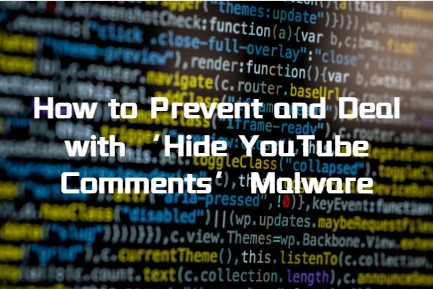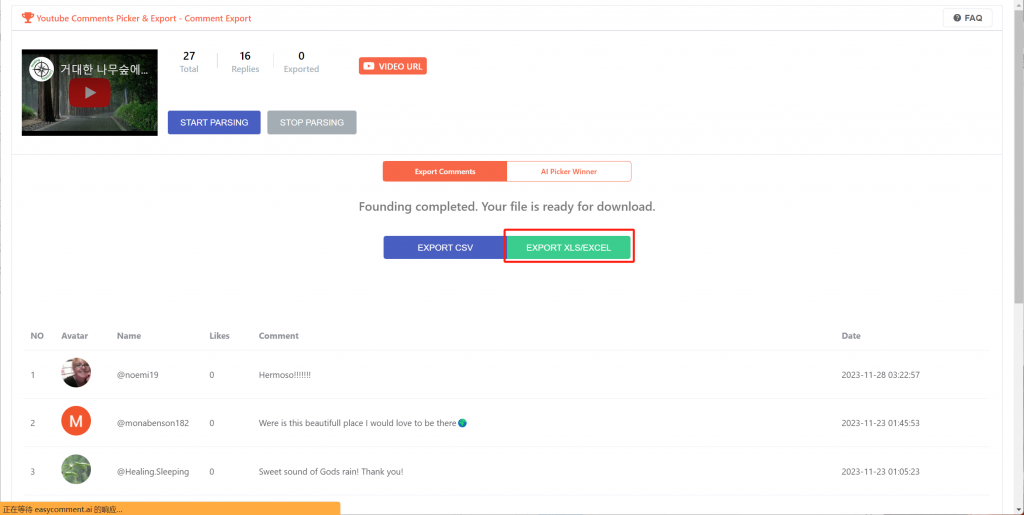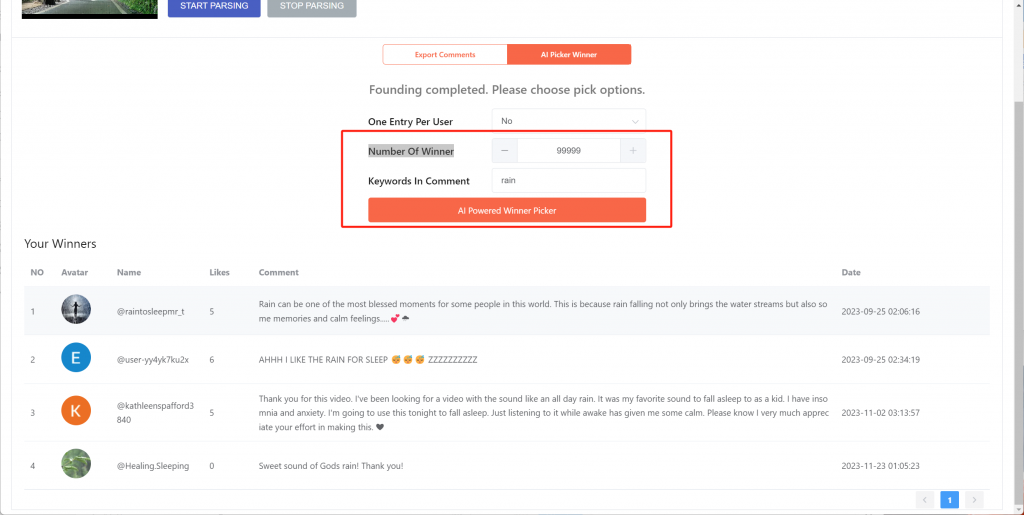
1. What is Hide YouTube Comments Malware?
"Hide YouTube Comments" is being referred to as malware due to its deceptive behavior. It disguises itself as a legitimate browser extension but, in reality, negatively impacts the user's system. It causes issues such as slow performance, intrusive ads, and redirects to potentially dangerous websites.
Additionally, this malware is said to take control of the browser and modify YouTube settings, hence the association with YouTube comments.
Users are advised to be cautious with browser extensions, ensuring they come from reputable sources to avoid falling victim to such deceptive practices.
2. Why Hide YouTube Comments Malware Can Ruin Your Youtube Experience?
"Hide YouTube Comments" malware can compromise your YouTube experience by introducing various security risks. Here's how it can negatively impact your usage:
#1: Sluggish Performance
The Hide YouTube Comments Malware may generate unwanted and intrusive advertisements, popping up during your YouTube sessions and disrupting your viewing experience.
#2: Intrusive Ads
The Hide YouTube Comments Malware may generate unwanted and intrusive advertisements, popping up during your YouTube sessions and disrupting your viewing experience.
#3: Unauthorized Redirects
Users may be redirected to dangerous websites without their consent. This not only disrupts your intended YouTube experience but also poses a potential security threat.
#4: Deceptive Browser Extension
"Hide YouTube Comments" disguises itself as a legitimate browser extension, tricking users into installing malware. This deceptive behavior undermines user trust and security.
#5: Modification of YouTube Settings
The malware goes beyond typical adware by modifying YouTube settings. This unauthorized alteration can lead to unexpected changes in your YouTube preferences and hinder the overall user experience.
#6: Privacy Concerns
Malware may compromise your privacy by collecting and transmitting personal information without your knowledge. This poses a significant risk to your online security.
In summary, "Hide YouTube Comments" malware can ruin your YouTube experience by causing disruptions, compromising performance, and introducing potential security threats. To mitigate these risks, it's crucial to use reliable antivirus software, be cautious with browser extensions, and only download from trusted sources.
3. Under what circumstances will we come into contact with "Hide YouTube Comments" malware?
#1 Deceptive Browser Extensions:
Users may unintentionally install the malware when downloading and installing browser extensions. Malicious extensions often disguise themselves as legitimate tools or utilities.
#2 Untrustworthy Sources:
Downloading software or browser extensions from unverified or unofficial sources increases the risk of encountering malware. Stick to reputable sources to minimize this risk.
#3 Clicking on Suspicious Links:
Clicking on suspicious links, especially those received in emails or on untrustworthy websites, can lead to the installation of malware. Exercise caution when navigating unfamiliar sites.
#4 Outdated Software:
Using outdated browser versions or operating systems can expose vulnerabilities that malware can exploit. Regularly update your software to patch security holes.
#5 Social Engineering Attacks: 、
Malicious actors may use social engineering tactics, such as fake alerts or enticing offers, to trick users into downloading and installing malware. Be wary of unsolicited messages or pop-ups.
#6 Compromised Websites:
Visiting compromised or malicious websites can expose your system to malware. Ensure that the websites you visit are reputable and secure.
4. How to prevent "Hide YouTube Comments" malware from attacking our computers?
To prevent "Hide YouTube Comments" malware or similar threats from attacking your computer, follow these proactive measures:
- Use Reputable Security Software: Install and regularly update reputable antivirus or anti-malware software. Enable real-time scanning to detect and block potential threats.
- Update Operating System and Software: Keep your operating system, browser, and all installed software up to date. Regular updates often include security patches that address vulnerabilities.
- Be Cautious with Browser Extensions: Only download browser extensions from official stores or trusted sources. Avoid installing extensions from unknown or suspicious websites.
- Exercise Safe Browsing Habits: Avoid clicking on suspicious links, especially those in emails or on unfamiliar websites. Be cautious with pop-ups and ads, and never download software from unverified sources.
- Verify Websites: Ensure that the websites you visit are secure and trustworthy. Look for HTTPS in the website address and be cautious when providing personal information.
- Educate Yourself: Stay informed about common online threats and phishing tactics. Be skeptical of unsolicited emails, messages, or pop-ups, especially those promising unexpected rewards.
- Use a Firewall: Enable a firewall on your computer to monitor and control incoming and outgoing network traffic, providing an additional layer of protection.
- Regularly Backup Your Data: In case of a malware attack, having regular backups of your important data can help you restore your files without paying a ransom or suffering permanent loss.
- Implement Strong Passwords: Use strong, unique passwords for your online accounts. Consider using a reputable password manager to generate and store complex passwords securely.
5. How to remove "Hide YouTube Comments" malware?
- Run a Full Antivirus Scan: Use your antivirus or anti-malware software to perform a thorough scan of your system. Ensure that your antivirus definitions are up to date before initiating the scan.
- Uninstall Suspicious Programs: Go to your computer's control panel and uninstall any recently installed or suspicious programs. Look for unfamiliar applications, especially those installed around the time you noticed issues.
- Remove Malicious Browser Extensions: Open your browser's settings and navigate to the extensions or add-ons section. Remove any suspicious or unfamiliar extensions, including "Hide YouTube Comments" if present.
- Clear Browser Cache and Cookies: Clear your browser's cache and cookies to remove any stored data related to the malware. This step varies depending on the browser you are using.
- Reset Browser Settings: Resetting your browser settings can help remove unwanted changes caused by the malware. This option is usually available in your browser's settings.
- Check Hosts File: Malware may modify the hosts file to redirect traffic. Check the hosts file for any unusual entries and remove them. The hosts file is typically located in C:\Windows\System32\drivers\etc\hosts.
- Boot into Safe Mode: Restart your computer in Safe Mode to prevent the malware from running during the removal process. This can be done by restarting your computer and pressing the F8 key (or Shift + F8) during the boot process.
- Use Anti-Malware Tools: Consider using additional anti-malware tools such as Malwarebytes or AdwCleaner. Run a scan with these tools to catch any remaining malware.
- Restore from Backup (if necessary): If the malware has caused irreversible damage, you may need to restore your system from a clean backup made before the infection occurred.
- Seek Professional Help: If the malware persists or you are unsure about certain steps, consider seeking assistance from professional IT support or a trusted tech service.
6. Conclusion
Defending against "Hide YouTube Comments" malware demands proactive measures. From vigilant browsing habits to swift removal tactics, staying informed and secure is key. Safeguard your YouTube journey by fortifying defenses and responding promptly to potential threats.



